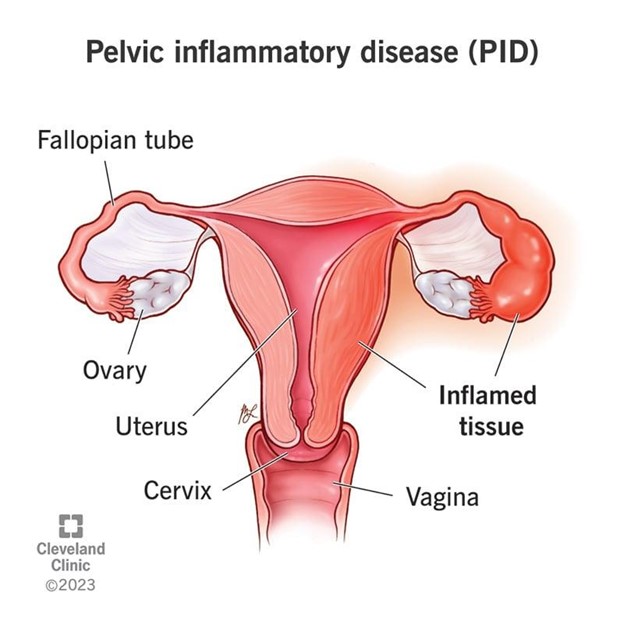Which information on a client's health history would the nurse identify as contributing to the client's risk for an ectopic pregnancy?
Recurrent pelvic infections
Ovarian cyst 2 years ago
Use of oral contraceptives for 8 years
Heavy, irregular periods
The Correct Answer is A
Choice A Reason: This is correct because recurrent pelvic infections, such as pelvic inflammatory disease (PID), can cause scarring and inflammation of the fallopian tubes, which can impair the normal movement of the fertilized egg to the uterus. This can increase the risk of ectopic pregnancy, which is a life-threatening condition where the fertilized egg implants outside the uterine cavity, usually in the fallopian tube.
Choice B Reason: This is incorrect because ovarian cysts are fluid-filled sacs that develop in or on the ovaries. They are usually benign and do not affect fertility or pregnancy. However, some types of ovarian cysts, such as endometriomas or dermoid cysts, may require surgery to remove them, which can cause damage to the ovaries or fallopian tubes and increase the risk of ectopic pregnancy.
Choice C Reason: This is incorrect because use of oral contraceptives for 8 years is not a risk factor for ectopic pregnancy. In fact, oral contraceptives can reduce the risk of ectopic pregnancy by preventing ovulation and fertilization. However, if a woman becomes pregnant while taking oral contraceptives, she should stop taking them and consult her doctor, as they may have adverse effects on the developing fetus.
Choice D Reason: This is incorrect because heavy, irregular periods are not a risk factor for ectopic pregnancy. They may indicate other conditions such as hormonal imbalance, uterine fibroids, polycystic ovary syndrome (PCOS), or endometriosis, which can affect fertility or pregnancy, but not necessarily cause ectopic pregnancy.

Nursing Test Bank
Naxlex Comprehensive Predictor Exams
Related Questions
Correct Answer is A
Explanation
Choice A Reason: This is correct because this description accurately reflects one of the main functions of amniotic fluid, which is to act as a shock absorber and buffer against external forces or movements that could harm the fetus. Amniotic fluid also allows the fetus to move freely and develop its muscles and bones.
Choice B Reason: This is incorrect because this description is false. The amount of amniotic fluid changes throughout the pregnancy, depending on the stage of fetal development and other factors. The normal range of amniotic fluid volume is between 500 and 1000 mL at term. Too much or too little amniotic fluid can indicate a problem with the fetus or the placenta.
Choice C Reason: This is incorrect because this description is false. The fluid is not mostly protein, but mostly water (about 98%). The water comes from the mother's blood plasma and the fetal urine. The remaining 2% of amniotic fluid consists of various substances, such as electrolytes, hormones, enzymes, antibodies, and fetal cells. Amniotic fluid does not provide nourishment to the fetus, but rather protects it from infection and helps regulate its temperature.
Choice D Reason: This is incorrect because this description is false. Amniotic fluid does not act as a transport mechanism for oxygen and nutrients, but rather as a barrier that prevents them from reaching the fetus directly. Oxygen and nutrients are delivered to the fetus through the placenta and the umbilical cord, which are connected to the maternal blood circulation.
Correct Answer is B
Explanation
Choice A Reason: This is incorrect because maternal diabetes is a condition where the mother has high blood sugar levels during pregnancy. It can cause polyhydramnios, or excess amniotic fluid, not oligohydramnios, or low amniotic fluid.
Choice B Reason: This is correct because fetal anencephaly is a congenital defect where the fetus lacks parts of the brain and skull. It can cause oligohydramnios, as the fetus does not produce enough urine to contribute to the amniotic fluid volume.
Choice C Reason: This is incorrect because placental abruption is a complication where the placenta detaches from the uterine wall before delivery. It can cause bleeding, pain, and fetal distress, but not oligohydramnios.
Choice D Reason: This is incorrect because neural tube defects are congenital defects where the spinal cord or brain does not develop properly. They can cause various neurological problems, but not oligohydramnios.

Whether you are a student looking to ace your exams or a practicing nurse seeking to enhance your expertise , our nursing education contents will empower you with the confidence and competence to make a difference in the lives of patients and become a respected leader in the healthcare field.
Visit Naxlex, invest in your future and unlock endless possibilities with our unparalleled nursing education contents today
Report Wrong Answer on the Current Question
Do you disagree with the answer? If yes, what is your expected answer? Explain.
Kindly be descriptive with the issue you are facing.
